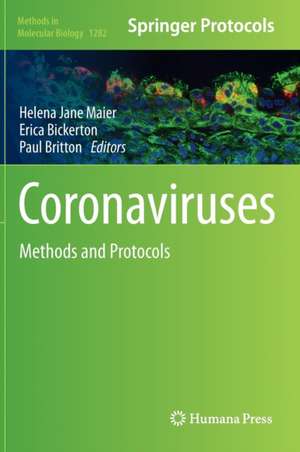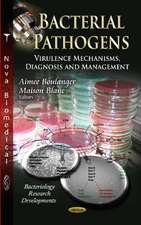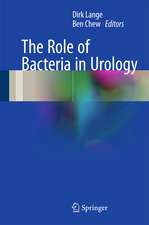Coronaviruses: Methods and Protocols: Methods in Molecular Biology, cartea 1282
Editat de Helena Jane Maier, Erica Bickerton, Paul Brittonen Limba Engleză Hardback – 27 feb 2015
Authoritative and practical, Coronaviruses: Methods and Protocols appeals to a wide variety of scientists because it highlights techniques that are currently used in the coronovirology field, while also discussing practices applicable to other virology fields.
| Toate formatele și edițiile | Preț | Express |
|---|---|---|
| Paperback (1) | 581.33 lei 38-44 zile | |
| Springer – 5 oct 2016 | 581.33 lei 38-44 zile | |
| Hardback (1) | 955.56 lei 6-8 săpt. | |
| Springer – 27 feb 2015 | 955.56 lei 6-8 săpt. |
Din seria Methods in Molecular Biology
- 9%
 Preț: 791.63 lei
Preț: 791.63 lei - 23%
 Preț: 598.58 lei
Preț: 598.58 lei - 20%
 Preț: 882.98 lei
Preț: 882.98 lei -
 Preț: 252.05 lei
Preț: 252.05 lei - 5%
 Preț: 802.70 lei
Preț: 802.70 lei - 5%
 Preț: 729.61 lei
Preț: 729.61 lei - 5%
 Preț: 731.43 lei
Preț: 731.43 lei - 5%
 Preț: 741.30 lei
Preț: 741.30 lei - 5%
 Preț: 747.16 lei
Preț: 747.16 lei - 15%
 Preț: 663.45 lei
Preț: 663.45 lei - 18%
 Preț: 1025.34 lei
Preț: 1025.34 lei - 5%
 Preț: 734.57 lei
Preț: 734.57 lei - 18%
 Preț: 914.20 lei
Preț: 914.20 lei - 15%
 Preț: 664.61 lei
Preț: 664.61 lei - 15%
 Preț: 654.12 lei
Preț: 654.12 lei - 18%
 Preț: 1414.74 lei
Preț: 1414.74 lei - 5%
 Preț: 742.60 lei
Preț: 742.60 lei - 20%
 Preț: 821.65 lei
Preț: 821.65 lei - 18%
 Preț: 972.30 lei
Preț: 972.30 lei - 15%
 Preț: 660.49 lei
Preț: 660.49 lei - 5%
 Preț: 738.41 lei
Preț: 738.41 lei - 18%
 Preț: 984.92 lei
Preț: 984.92 lei - 5%
 Preț: 733.29 lei
Preț: 733.29 lei -
 Preț: 392.60 lei
Preț: 392.60 lei - 5%
 Preț: 746.26 lei
Preț: 746.26 lei - 18%
 Preț: 962.66 lei
Preț: 962.66 lei - 23%
 Preț: 860.22 lei
Preț: 860.22 lei - 15%
 Preț: 652.64 lei
Preț: 652.64 lei - 5%
 Preț: 1055.50 lei
Preț: 1055.50 lei - 23%
 Preț: 883.87 lei
Preț: 883.87 lei - 5%
 Preț: 1141.13 lei
Preț: 1141.13 lei - 19%
 Preț: 491.89 lei
Preț: 491.89 lei - 5%
 Preț: 1038.86 lei
Preț: 1038.86 lei - 5%
 Preț: 524.16 lei
Preț: 524.16 lei - 18%
 Preț: 2122.34 lei
Preț: 2122.34 lei - 5%
 Preț: 1299.23 lei
Preț: 1299.23 lei - 5%
 Preț: 1339.12 lei
Preț: 1339.12 lei - 18%
 Preț: 1390.26 lei
Preț: 1390.26 lei - 18%
 Preț: 1395.63 lei
Preț: 1395.63 lei - 18%
 Preț: 1129.65 lei
Preț: 1129.65 lei - 18%
 Preț: 1408.26 lei
Preț: 1408.26 lei - 18%
 Preț: 1124.92 lei
Preț: 1124.92 lei - 18%
 Preț: 966.27 lei
Preț: 966.27 lei - 5%
 Preț: 1299.99 lei
Preț: 1299.99 lei - 5%
 Preț: 1108.51 lei
Preț: 1108.51 lei - 5%
 Preț: 983.76 lei
Preț: 983.76 lei - 5%
 Preț: 728.16 lei
Preț: 728.16 lei - 18%
 Preț: 1118.62 lei
Preț: 1118.62 lei - 18%
 Preț: 955.25 lei
Preț: 955.25 lei - 5%
 Preț: 1035.62 lei
Preț: 1035.62 lei
Preț: 955.56 lei
Preț vechi: 1165.32 lei
-18% Nou
Puncte Express: 1433
Preț estimativ în valută:
182.87€ • 198.57$ • 153.61£
182.87€ • 198.57$ • 153.61£
Carte tipărită la comandă
Livrare economică 23 aprilie-07 mai
Preluare comenzi: 021 569.72.76
Specificații
ISBN-13: 9781493924370
ISBN-10: 1493924370
Pagini: 300
Ilustrații: XI, 285 p. 42 illus., 27 illus. in color.
Dimensiuni: 178 x 254 x 22 mm
Greutate: 0.74 kg
Ediția:2015
Editura: Springer
Colecția Humana
Seria Methods in Molecular Biology
Locul publicării:New York, NY, United States
ISBN-10: 1493924370
Pagini: 300
Ilustrații: XI, 285 p. 42 illus., 27 illus. in color.
Dimensiuni: 178 x 254 x 22 mm
Greutate: 0.74 kg
Ediția:2015
Editura: Springer
Colecția Humana
Seria Methods in Molecular Biology
Locul publicării:New York, NY, United States
Public țintă
Professional/practitionerCuprins
Coronaviruses: An Overview of Their Replication and Pathogenesis.- Identification of a Novel Coronavirus from Guinea Fowl Using Metagenomics.- Serological Diagnosis of Feline Coronavirus Infection by Immunochromatographic Test.- Estimation of Evolutionary Dynamics and Selection Pressure in Coronaviruses.- The Preparation of Chicken Tracheal Organ Cultures for Virus Isolation, Propagation, and Titration.- The Preparation of Chicken Kidney Cell Cultures for Virus Propagation.- Isolation and Propagation of Coronaviruses in Embryonated Eggs.- Characterization of Human Coronaviruses on Well-Differentiated Human Airway Epithelial Cell Cultures.- Quantification of Infectious Bronchitis Coronaviruses by Titration in vitro and in ovo.- Purification of Coronavirus Virions for Cryo-EM and Proteomic Analysis.- Partial Purification of IBV and Subsequent Isolation of Viral RNA for Next Generation Sequencing.- Transient Dominant Selection for the Modification and Generation of Recombinant Infectious Bronchitis Coronaviruses.- Engineering Infectious cDNAs of Coronavirus as Bacterial Artificial Chromosomes.- Protein Histochemistry Using Coronaviral Spike Proteins: Studying Binding Profiles and Sialic Acid Requirements for Attachment to Tissues.- Identification of Protein Receptors for Coronaviruses by Mass Spectrometry.- Single Particle Tracking Assay to Study Coronavirus Membrane Fusion.- Studying Coronavirus-Host Protein Interactions.- A Field-Proven Yeast Two-Hybrid Protocol Used to Identify Coronavirus-Host Protein-Protein Interactions.- Investigation of the Functional Roles of Host Cell Proteins Involved in Coronavirus Infection Using Highly Specific and Scalable RNA Interference (RNAi) Approach.- Transcriptome Analysis ofFeline Infectious Peritonitis Virus (FIPV) Infection.- Quantification of Interferon Signaling in Avian Cells.- Studying the Dynamics of Coronavirus Replicative Structures.- Preparation of Cultured Cells Using High Pressure Freezing and Freeze Substitution for Subsequent 2D or 3D Visualization in the Transmission Electron Microscope.
Textul de pe ultima copertă
This volume aims to describe a variety of techniques that reflects the wide range of research currently performed in the field of coronavirology, and begins with an overview of current understandings of coronavirus replication and pathogenesis to introduce specialists and non-specialists to the field. The rest of the book is divided into several sections of chapters beginning with those that describe identification, diagnosis, and study of the evolution of coronaviruses. The next few chapters discuss the preparation of cells and organ cultures useful in propagating coronaviruses and titration techniques, as well as techniques for analyzing virus functions that require purification of the viruses. The next chapters describe two commonly used reverse genetics techniques for coronaviruses, and techniques detailing identification of cellular receptors, binding profiles of viral attachment proteins, and virus-cell fusion. The final chapters cover a broad spectrum of techniques to identify virus-host protein-protein interactions, confirm the functional role of these proteins in virus replication, study host cell responses through genome-wide or pathway-specific approaches, and visualize virus replication complexes. Written in the highly successful Methods in Molecular Biology series format, the chapters include the kind of detailed description and implementation advice that is crucial for getting optimal results in the laboratory.
Authoritative and practical, Coronaviruses: Methods and Protocols appeals to a wide variety of scientists because it highlights techniques that are currently used in the coronovirology field, while also discussing practices applicable to other virology fields.
Authoritative and practical, Coronaviruses: Methods and Protocols appeals to a wide variety of scientists because it highlights techniques that are currently used in the coronovirology field, while also discussing practices applicable to other virology fields.
Caracteristici
Includes cutting-edge methods and protocols Provides step-by-step detail essential for reproducible results Contains key notes and implementation advice from the experts Includes supplementary material: sn.pub/extras









